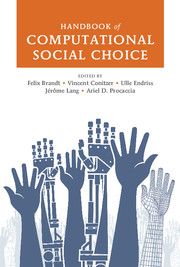19 - Knockout Tournaments
from Part IV - Additional Topics
Published online by Cambridge University Press: 05 May 2016
Summary
Introduction
The theory of social choice has developed an immense variety of voting rules, ranging from simple rules such as plurality to more complicated rules such as the tournament equilibrium set studied in Chapter 3. Even though the variety may seem vast, most voting rules can be grouped into a small number of types. The main two types are scoring rules and Condorcet-consistent rules (also called Condorcet extensions). The former contain rules such as Borda and approval voting. A large portion of the latter type of rules consists of majority rules that determine the winner by using pairwise comparisons between candidates using the majority rule. Examples of such rules include the binary cup and the tournament solutions such as the Slater, Banks and uncovered sets (see Chapter 3).
Majority voting rules can be viewed as tournaments: competitions between the candidates that determine the winner using some rule based solely on the results of matches, that is pairwise comparisons.
Besides as voting rules, tournaments are prevalent in many social settings, most commonly in sports competitions, but also in patent races (Lita, 2008; Durant, 2010), hiring employees (Ryvkin, 2010), and even drug trials (these are commonly referred to as “head-to-head” drug trials).
Tournaments have a wide variety of formats; their common feature is that they proceed in stages. In each stage several pairwise comparisons called matches take place. As mentioned earlier, in social choice, a match is typically implemented by a simple majority rule. The outcome of the matches in a stage influences (using some rule) which matches take place in the next stage. In the final stage a winner is determined. Different types of tournaments differ in how matches in different stages are selected and how the final winner is determined.
A very common type of tournament is the so-called knockout or single-elimination tournament. In a knockout tournament, no ties are allowed, so that everymatch produces a match winner. The important property of a knockout tournament is that once a player loses a match, he is eliminated, that is, “knocked-out,” from the tournament. Thus the winner of a knockout tournament has won all of her matches.
- Type
- Chapter
- Information
- Handbook of Computational Social Choice , pp. 453 - 474Publisher: Cambridge University PressPrint publication year: 2016
- 3
- Cited by



